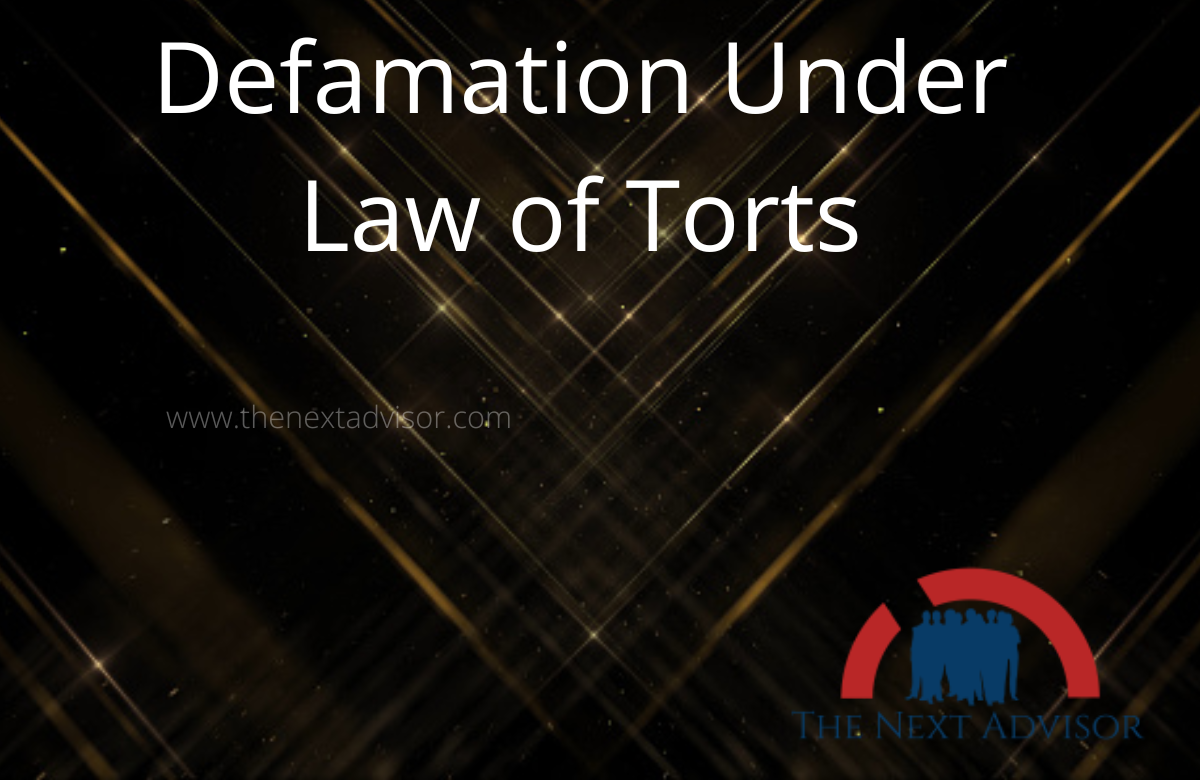Defamation Under the Law of Torts or IPC in Section 499 and Defamation under the law of torts is defined by different jurists in different ways. Punishment for the offence of Defamation is given in Section 500 of the Indian Penal Code.
Some Definitions of Defamation under the law of torts – Defamation Is defined by the eminent jurists as under :
Winfield: – ” Defamation is the publication of a statement which tends to lower a person in the estimation of right-thinking members of society generally or which tends to make them shun or avoid that person “.
Salmond: – ” Defamation is the publication of a false and defamatory statement regarding another without any justification ” . 7
DEFAMATION Under the law of trots
Essentials of Defamation: These are the following essentials –
1. The statement must be defamatory – A statement will be defamatory if it: Exposes the plaintiff to hatred, contempt, ridicule or –
➤ Tends to injure him in his profession or trade or – Causes him to be shunned or avoided by his neighbors or by members of the society.
Essentials of Defamation: These are the following essentials –
2. The statement must refer to the plaintiff: The statement alleged to be defamatory must refer to the plaintiff. It is, however, not necessary to show that the defendant intended it to refer to the plaintiff.
]Essentials of Defamation: These are the following essentials –
3. The statement must be published: Publication ‘ means making known the matter to some person other than the plaintiff. Thus, no action can be maintained unless there is a publication. No civil action, therefore, lies if the defamatory words are communicated only to the person spoken of because that cannot injure his reputation
Kinds of Defamation: – Defamation is a generic term containing its two forms
i ) libel and
ii ) slander
1. Libel- A libel is a publication of a false and defamatory statement, in some permanent form, tending to injure the reputation of another person, without lawful justification or excuse.
2. Slander – A slander is a false and defamatory verbal or oral statement in some transitory form, tending to injure the reputation of another, without lawful justification or excuse. It may be noted that slander is not actionable without proof of special damage, i.e., it is not actionable per se.
Differences between libel and slander :
Libel – Libel is the defamation in a written permanent form, normally addressed to the eye. In India, In India as well as in England libel is both a tort and a crime. In the case of libel, there exists malice and greater deliberation. In the case of libel, the actual publisher may be an innocent person and thus, may not be liable.
Slander – Slander is the defamation in an oral or transient form addressed to the ear. slander is also both a tort and a crime but in England, slander is a civil wrong only. Slander may be uttered in the heat of the moment and under a sudden provocation. In case of slander, the publisher acts consciously and voluntarily and must always be liable.
Exceptions of Defamation :
1. Justified by truth: It is a complete defence to an action for libel or slander that the words complained of are true in substance, for the law will not permit a man to recover damages in respect of an injury to a character which he does not, or ought not to possess.
Exceptions of Defamation :
2. Fair and bona fide comment: A fair and bona fide comment on the matter of public interest does not attract any liability, however, severe it may be in its terms. But the comment must be bona fide, and must not be made a cloak for malice. Legitimate criticism is not a tort.
Exceptions of Defamation :
3. Privileged communications :
A ) Absolute privilege:
➤Parliamentary proceedings
➤ Judicial Proceedings
➤Military and naval proceedings
➤State proceedings
B ) Qualified Privilege:
➤Statement made in a performance of a duty.
➤Statement made in the protection of common interests.
➤Fair and accurate reports.



























